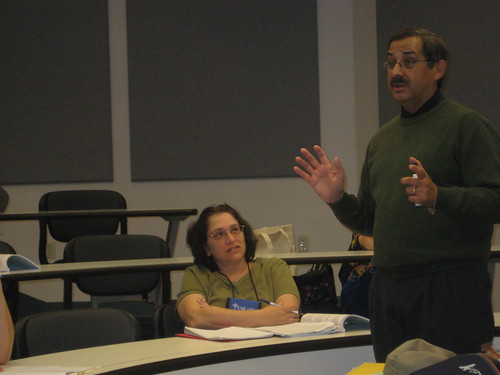
Richard Fruend talks about the Jewish ethics of sex. Sort of.
I am sitting in a class ostensibly about teaching Jewish sexual ethics to high school, college and seminary students, given by Richard Freund, a professor of Jewish ethics at Hartford University. It’s halfway through the session, and still no talk of sex.
But Freund is suggesting an interesting pedagogical tactic. He doesn’t assign his students – who are of all faiths – tests or term papers. Instead he asks each student to write a two-page position paper on each of the topics he covers. The papers are neither right nor wrong. They are just about discussion and thought. And Freund keeps every one of the papers because he is writing a book about thoughts on Jewish ethics.
One position paper, he said, had reverberations well beyond grade point average. A couple of years ago, a parent of a former student called him. The student, who was a 19-year-old junior in 2003, was put on a respirator, and his parents were trying to figure out what to do. The last session of Freund’s class talks about the ethics of death. The student had written two position papers on end-of-life matters, which Freund read to the parents over the phone. He gets choked up as he tells the story, which ends with the boy’s father saying, “Thank you. We know what to do.”
The story is foreplay for the sexual discussion. I think.
Freund says that parents simply don’t talk to their kids about a whole array of complicated topics – including sex. And Jewish ethics class is a place where young people can express their thoughts.
** update**
Class started at 10:15 and is over at 11:30. It is 11:05 and still no sex.
** update**
11:15 and no sex. I’m starting to think this was a tease (just like the headline on that post).
** update**
11:20. Still no sex, but I think we’re getting there.
** update**
11:25: SEX!
“I have no doubt the Bible is viewed as our source on all of our tsures on sexual ethics,” says Freund. “But I have no doubt that it is not true.”
Most people cite Leviticus, where the Bible says that male-with-male sex is an abomination, as the source for the forbidding of homosexual activity.
But, Freund says, the Bible has hundreds of abominations. Most of them regarding food.
The trick is to look at the context in which the Bible was written - during a time when male priests in other religions would copulate with each other publicly to ensure a year of fertility. The Bible, he says, is forbidding ritual homosexuality between men, not social homosexuality.
The rabbis later forbade social homosexuality, he said, because during Greek and Roman times, homosexuality was a normative practice for younger adults.
So, you can think whatever you want about homosexuality, says Freund, “Just don’t blame the Bible. Blame the rabbis!”
JTA has documented Jewish history in real-time for over a century. Keep our journalism strong by joining us in supporting independent, award-winning reporting.





